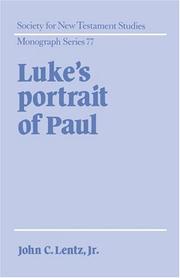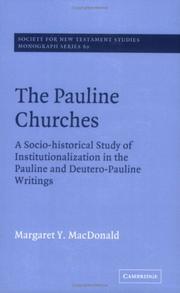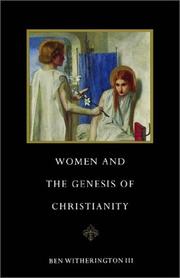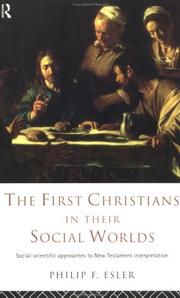| Listing 1 - 7 of 7 |
Sort by
|
Book
ISBN: 8834325087 9788834325087 Year: 2000 Volume: 16 Publisher: Milano: Vita e pensiero,
Abstract | Keywords | Export | Availability | Bookmark
 Loading...
Loading...Choose an application
- Reference Manager
- EndNote
- RefWorks (Direct export to RefWorks)
Bible--Sociologie --- Bible--Sociology --- Biblical ethics --- Biblical sociology --- Bijbel--Sociologie --- Bijbelse ethiek --- Bijbelse sociologie --- Ethics [Biblical ] --- Ethics in the Bible --- Ethiek [Bijbelse ] --- Ethiek in de Bijbel --- Ethique biblique --- Ethique dans la Bible --- Sociologie [Bijbelse ] --- Sociologie biblique --- Sociology [Biblical ] --- Christian ethics --- Morale chrétienne --- History --- Histoire --- 241.09015 --- Christian ethics (1-499) --- Morale chrétienne --- Primitive and early church, ca. 30-600 A.D. --- Bible. New Testament --- Criticism, interpretation, etc
Book
ISBN: 0300047355 Year: 1990 Publisher: New Haven London Yale university press
Abstract | Keywords | Export | Availability | Bookmark
 Loading...
Loading...Choose an application
- Reference Manager
- EndNote
- RefWorks (Direct export to RefWorks)
Bible--Sociologie --- Bible--Sociology --- Biblical sociology --- Bijbel--Sociologie --- Bijbelse sociologie --- Sociologie [Bijbelse ] --- Sociologie biblique --- Sociology [Biblical ] --- 227.08 --- Salvation --- -Slaves --- -Sociology, Biblical --- Christian sociology --- Religion and sociology --- Enslaved persons --- Persons --- Slavery --- Religion --- Paulinische theologie --- Biblical teaching --- Slaves --- Sociology, Biblical. --- Biblical teaching. --- 227.08 Paulinische theologie --- Sociology, Biblical --- Bible. --- Epistles of Paul --- Paul, Epistles of --- Paul Sŏsin --- Pauline epistles --- Risālat al-Qiddīs Būlus al-rasūl al-thāniyah ilá Tīmūthīʼūs --- Criticism, interpretation, etc. --- Bible. N.T. Epistles of Paul --- Criticism, interpretation, etc

ISBN: 0521433169 0521609453 0511520387 Year: 1993 Volume: 77 Publisher: Cambridge : Cambridge University press,
Abstract | Keywords | Export | Availability | Bookmark
 Loading...
Loading...Choose an application
- Reference Manager
- EndNote
- RefWorks (Direct export to RefWorks)
The purpose of this book is to seek a fuller understanding of how the characterisation of Paul in Acts would have been perceived by those who first read or heard the Lucan narrative. As the author makes clear, the careful reader of Acts should be amazed at the way St Paul is portrayed therein. Dr Lentz demonstrates, through a careful examination of particular texts, the great improbability that a Jew of strict Pharisaic background would have held, let alone been proud of, Roman citizenship and citizenship of the city of Tarsus. By investigating the social and legal expectations of the first century, the author shows that Paul is seen to be deferred to in matters of legal minutiae by those in positions of authority. He is given high social status and abundant moral virtue in order to attract to Christianity the high-ranking citizen who would recognise in Paul the classical cardinal virtues.
Bible--Sociologie --- Bible--Sociology --- Biblical sociology --- Bijbel--Sociologie --- Bijbelse sociologie --- Sociologie [Bijbelse ] --- Sociologie biblique --- Sociology [Biblical ] --- 226.6 --- Handelingen der apostelen. Akten van de apostelen. --- Paul, --- Paul --- Bible. N.T. Acts --- Criticism, interpretation, etc --- Arts and Humanities --- Religion --- Sociology, Biblical. --- Bible. --- Criticism, interpretation, etc. --- Christian sociology --- Religion and sociology --- Biblical teaching --- Pavel, --- Pavol, --- Paulus, --- Paulos, --- Pōghos, --- Paweł, --- Pawełm --- Būlus, --- Pablo, --- Paulo, --- Paolo, --- Pál, --- Apostolos Paulos --- Saul, --- القديس بولس الرسول --- بولس، --- 사도바울 --- Acts (Book of the New Testament) --- Acts of the Apostles --- Chongdo haengjŏn --- Sado haengjŏn

ISBN: 0521353378 0521616050 0511470452 9780521353373 0511874251 9780511470455 9780521616058 Year: 1988 Volume: 60 Publisher: Cambridge Cambridge University Press
Abstract | Keywords | Export | Availability | Bookmark
 Loading...
Loading...Choose an application
- Reference Manager
- EndNote
- RefWorks (Direct export to RefWorks)
The author studies the Pauline corpus in order to trace the process of institutionalisation in the Pauline communities. She claims that development can be traced since we have not only letters from Paul himself, but also the Pastoral epistles from the beginning of the second century, as well as Ephesians and Colossians, writings which are characteristic of the ambiguous period following the disappearance of the earliest authorities. This is the first substantial examination of the Pauline corpus from this angle; it also incorporates effectively insights from the social sciences.
Bible--Sociologie --- Bible--Sociology --- Biblical sociology --- Bijbel--Sociologie --- Bijbelse sociologie --- Sociologie [Bijbelse ] --- Sociologie biblique --- Sociology [Biblical ] --- Sociology, Biblical. --- Church history --- Pauline churches. --- 227.1 --- Sociology, Biblical --- -Pauline churches --- Pauline Christian communities --- Church development, New --- Christianity --- Ecclesiastical history --- History, Church --- History, Ecclesiastical --- History --- Christian sociology --- Religion and sociology --- Brieven van Paulus--(algemeen) --- Biblical teaching --- 227.1 Brieven van Paulus--(algemeen) --- Bible. N.T. Epistles of Paul --- Criticism, interpretation, etc --- Primitive and early church, ca. 30-600 A.D. --- Arts and Humanities --- Religion --- Church history - Primitive and early church, ca. 30-600. --- Bible. --- Criticism, interpretation, etc. --- Apostolic Church --- Church, Apostolic --- Early Christianity --- Early church --- Primitive and early church --- Primitive Christianity --- Fathers of the church --- Great Apostasy (Mormon doctrine) --- Epistles of Paul --- Paul, Epistles of --- Paul Sŏsin --- Pauline epistles --- Risālat al-Qiddīs Būlus al-rasūl al-thāniyah ilá Tīmūthīʼūs

ISBN: 0521367352 0521364973 0511555180 9780521364973 9780521367356 Year: 1990 Publisher: Cambridge: Cambridge university press,
Abstract | Keywords | Export | Availability | Bookmark
 Loading...
Loading...Choose an application
- Reference Manager
- EndNote
- RefWorks (Direct export to RefWorks)
This study explores the role of women in New Testament times. Beginning with the woman's place in Judaism, in the Hellenistic world, and in the Roman Empire, Witherington demonstrates how Jesus broke significantly with convention in how he viewed women, offering as he did a wholly new conception of the legitimate rights of women in society.
Bible--Femmes --- Bible--Sociologie --- Bible--Sociology --- Bible--Women --- Biblical sociology --- Bijbel--Sociologie --- Bijbel--Vrouwen --- Bijbelse sociologie --- Femmes dans la Bible --- Moeders--Bijbelleer --- Mothers--Biblical teaching --- Mères--Enseignement biblique --- Sociologie [Bijbelse ] --- Sociologie biblique --- Sociology [Biblical ] --- Vrouwen in de Bijbel --- Women in the Bible --- Women --- Women in Christianity --- Sociology, Biblical --- Biblical teaching --- History --- Bible. --- Criticism, interpretation, etc --- 22-055.2 --- 281.2 --- -Women in the Bible --- -Christian sociology --- Religion and sociology --- Christianity --- Human females --- Wimmin --- Woman --- Womon --- Womyn --- Females --- Human beings --- Femininity --- Vrouwen in de bijbel --- Apostolische Kerk. Judeo-christianisme:--tot einde 1ste eeuw --- -Biblical teaching --- -Vrouwen in de bijbel --- -22-055.2 --- 281.2 Apostolische Kerk. Judeo-christianisme:--tot einde 1ste eeuw --- 22-055.2 Vrouwen in de bijbel --- Christian sociology --- Ba-yon Tipan --- Bagong Tipan --- Jaji ma Hungi --- Kainē Diathēkē --- New Testament --- Nouveau Testament --- Novo Testamento --- Novum Testamentum --- Novyĭ Zavet --- Novyĭ Zavi︠e︡t Gospoda nashego Īisusa Khrista --- Novyĭ Zavit --- Nuevo Testamento --- Nuovo Testamento --- Nye Testamente --- Perjanjian Baru --- Dhamma sacʻ kyamʻʺ --- Injīl --- Criticism, interpretation, etc. --- Bible. New Testament --- Primitive and early church, ca. 30-600 A.D. --- Women - Biblical teaching. --- Women in the Bible. --- Bible. N.T. - Criticism, interpretation, etc. --- Women in Christianity - History - Early church, ca. 30-600. --- Sociology, Biblical. --- Arts and Humanities --- Religion --- Women - Biblical teaching --- Women in Christianity - History - Early church, ca. 30-600 --- Biblical teaching.
Book
ISBN: 2130478514 9782130478515 Year: 1997 Volume: 76 Publisher: Paris: PUF,
Abstract | Keywords | Export | Availability | Bookmark
 Loading...
Loading...Choose an application
- Reference Manager
- EndNote
- RefWorks (Direct export to RefWorks)
Bible--Sociologie --- Bible--Sociology --- Biblical sociology --- Bijbel--Sociologie --- Bijbelse sociologie --- Sociologie [Bijbelse ] --- Sociologie biblique --- Sociology [Biblical ] --- Sociology, Biblical --- Christian sociology --- Bible --- Sociologie religieuse --- History --- Sociologie --- Christianisme --- Histoire --- Bible. --- Criticism, interpretation, etc --- Critique, interprétation, etc --- Sociology, Biblical. --- 226.4 --- 226.6 --- 225.08*2 --- Evangelie volgens Lucas --- Handelingen der apostelen. Akten van de apostelen --- Theologie van het Nieuwe Testament: moraal; ethica; juridica Israelis --- 225.08*2 Theologie van het Nieuwe Testament: moraal; ethica; juridica Israelis --- Criticism, interpretation, etc. --- Critique, interprétation, etc --- Religion and sociology --- Biblical teaching --- Luc (Book of the New Testament) --- Lucas (Book of the New Testament) --- Luka (Book of the New Testament) --- Lukan săn zăn︠g︡g (Book of the New Testament) --- Lukas (Book of the New Testament) --- Luke (Book of the New Testament) --- Lūqā (Book of the New Testament) --- Nuga pogŭm (Book of the New Testament) --- Ruka den --- Ruka ni yoru fukuinsho --- Acts (Book of the New Testament) --- Acts of the Apostles --- Chongdo haengjŏn --- Sado haengjŏn --- Bible. N.T. Acts --- Christian sociology - History - Early church, ca. 30-600.

ISBN: 0415111226 9780415111225 Year: 1994 Publisher: London: Routledge,
Abstract | Keywords | Export | Availability | Bookmark
 Loading...
Loading...Choose an application
- Reference Manager
- EndNote
- RefWorks (Direct export to RefWorks)
Sociology, Biblical. --- Christian sociology --- History --- Bible--Sociologie --- Bible--Sociology --- Biblical sociology --- Bijbel--Sociologie --- Bijbelse sociologie --- Sociologie [Bijbelse ] --- Sociologie biblique --- Sociology [Biblical ] --- 225.08*9 --- 225.08*7 --- #GROL:SEMI-22:27'00' --- #GROL:SEMI-304<282>4 --- 225.08*7 Theologie van het Nieuwe Testament: relatie met het jodendom --- Theologie van het Nieuwe Testament: relatie met het jodendom --- 225.08*9 Theologie van het Nieuw Testament: relatie met het hellenisme --- Theologie van het Nieuw Testament: relatie met het hellenisme --- Sociology, Biblical --- Religion and sociology --- Biblical teaching --- Bible. --- Ba-yon Tipan --- Bagong Tipan --- Jaji ma Hungi --- Kainē Diathēkē --- New Testament --- Nouveau Testament --- Novo Testamento --- Novum Testamentum --- Novyĭ Zavet --- Novyĭ Zavi︠e︡t Gospoda nashego Īisusa Khrista --- Novyĭ Zavit --- Nuevo Testamento --- Nuovo Testamento --- Nye Testamente --- Perjanjian Baru --- Dhamma sacʻ kyamʻʺ --- Injīl --- Social scientific criticism. --- Bible. New Testament --- Social scientific criticism --- Primitive and early church, ca. 30-600 A.D. --- Bible. - N.T. - Social scientific criticism. --- Sociology, Christian - History - Early church, ca. 30-600. --- Christian sociology - History - Early church, ca. 30-600.
| Listing 1 - 7 of 7 |
Sort by
|

 Search
Search Feedback
Feedback About UniCat
About UniCat  Help
Help News
News